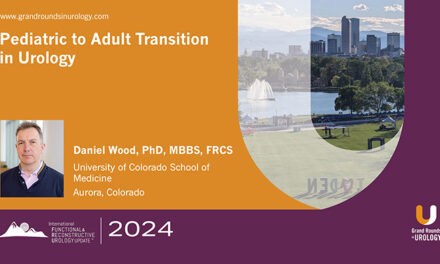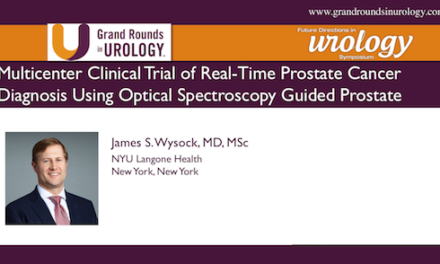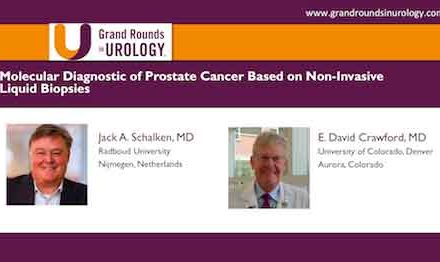Peter R. Carroll, MD, MPH, presented “Use of Polygenic Risk Scores for Prostate Cancer Screening” during the 31st International Prostate Cancer Update in July 2021 in Snowbird, Utah.
How to cite: Carroll, Peter R. “PSMA PET Imaging at Time of Diagnosis.” July 2021. Accessed Oct 2025. https://grandroundsinurology.com/use-of-polygenic-risk-scores-for-prostate-cancer-screening/
Use of Polygenic Risk Scores for Prostate Cancer Screening – Summary
Peter R. Carroll, MD, MPH, Professor of Prostate Cancer and Urology at the University of California, San Francisco, introduces his talk on polygenic risk scores by asserting that serum prostate-specific antigen (PSA) testing has limitations as a stand-alone screening tool. He explains that hereditary factors have a strong influence on prostate cancer risk and outcomes and that prostate cancer has high heritability. Dr. Carroll argues that while high-penetrance genes are important, they only explain a fraction of prostate cancer risk. Further, numerous genome-wide association studies (GWAS) have identified over 250 single nucleotide polymorphisms (SNPs) associated with risk. Dr. Carroll lays out the potential relevance of polygenic risk scores, showing where the scores have the potential to impact clinical care by supporting risk prediction, diagnosis, treatment decision-making, and prognosis of disease course and outcome. He then reviews a trans-ancestry genome-wide association meta-analysis of prostate cancer that demonstrates that genomic risk score (GRS) was predictive across populations. The study concluded that 269 risk variants were estimated to capture 33.6 percent of familial relative risk (FRR) in men of East Asian ancestry, 38.5 percent in Hispanic men, 42.6 percent in men of European ancestry, and 43.2 percent in men of African ancestry, with higher GRS associated with younger age at diagnosis and family history, but not disease aggressiveness. Dr. Carroll concludes with a summary of the use of GRS in prostate cancer early detection: prostate cancer is related to many risk variants across populations; GRS improves on the use of age and family history in assessing risk, though early detection guidelines have not incorporated GRS use yet; and larger populations (particularly those of African ancestry) require further examination.
About The 31st Annual International Prostate Cancer Update:
The International Prostate Cancer Update (IPCU), founded in 1990, is a multi-day CME conference focused on prostate cancer treatment updates with expert, international faculty. It is led by expert physicians and is designed for urologists, medical oncologists, radiation oncologists, and other healthcare professionals involved in the diagnosis and treatment of prostate cancer. Dr. Carroll delivered this educational activity during the 31st iteration of the meeting in July 2021 in Snowbird, Utah.
ABOUT THE AUTHOR
Dr. Peter Carroll holds the Ken and Donna Derr-Chevron Professorship in Prostate Cancer and the Taube Family Distinguished Professorship in Urology at the University of California, San Francisco (UCSF). He is also the Associate Director of Strategic Planning and Clinical Services and Program Leader of the Prostate Cancer Program at the Helen Diller Family Comprehensive Cancer Center at UCSF.
Dr. Carroll graduated with honors from Georgetown University School of Medicine. He then went on to complete general surgery training and a urology residency at UCSF, as well as a Fellowship in Urologic Oncology at Memorial Sloan Kettering Cancer Center in New York City. He has taught at the UCSF Department of Urology since 1986, and he became the department chair in 1996. Under his leadership, the department has been consistently ranked one of the top urology departments in the country by U.S. News and World Report. The department has grown, serving an increasingly larger patient population, expanding its research programs, and attracting future leaders in the field for training. Under Dr. Carroll’s leadership, the department managed an average of over $10 million in research grants that put UCSF in first place for urology funding for five consecutive years. Dr. Carroll also established the UCSF Department of Urology’s Tissue Core, a biobank of blood, urine, and residual prostate, bladder, and renal tissues for more than 6,000 consenting patients. In addition to his many accomplishments at UCSF, Dr. Carroll has authored or co-authored over 650 publications, is an active member of numerous professional medical societies, and is currently principal or co-investigator on numerous scientific studies. He is also Past-President of the American Board of Urology (2006-2008). His drive to perfect nerve-sparing prostatectomy has led to many technical innovations, and his pioneering efforts in standardizing an active surveillance regimen has led to many patients postponing radical treatment while maintaining a low risk of cancer progression.




